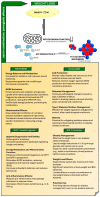Mitochondria and the Repurposing of Diabetes Drugs for Off-Label Health Benefits
- PMID: 39796218
- PMCID: PMC11719901
- DOI: 10.3390/ijms26010364
Mitochondria and the Repurposing of Diabetes Drugs for Off-Label Health Benefits
Abstract
This review describes our current understanding of the role of the mitochondria in the repurposing of the anti-diabetes drugs metformin, gliclazide, GLP-1 receptor agonists, and SGLT2 inhibitors for additional clinical benefits regarding unhealthy aging, long COVID, mental neurogenerative disorders, and obesity. Metformin, the most prominent of these diabetes drugs, has been called the "Drug of Miracles and Wonders," as clinical trials have found it to be beneficial for human patients suffering from these maladies. To promote viral replication in all infected human cells, SARS-CoV-2 stimulates the infected liver cells to produce glucose and to export it into the blood stream, which can cause diabetes in long COVID patients, and metformin, which reduces the levels of glucose in the blood, was shown to cut the incidence rate of long COVID in half for all patients recovering from SARS-CoV-2. Metformin leads to the phosphorylation of the AMP-activated protein kinase AMPK, which accelerates the import of glucose into cells via the glucose transporter GLUT4 and switches the cells to the starvation mode, counteracting the virus. Diabetes drugs also stimulate the unfolded protein response and thus mitophagy, which is beneficial for healthy aging and mental health. Diabetes drugs were also found to mimic exercise and help to reduce body weight.
Keywords: GLP-1 receptor agonists; SGLT2 inhibitors; gliclazide; long COVID; mental neurogenerative disorders; metformin; obesity; unhealthy aging.
Conflict of interest statement
The authors declare that they have no conflict of interest.
Figures




References
-
- Zhang S.Y., Bruce K., Danaei Z., Li R.J.W., Barros D.R., Kuah R., Lim Y.M., Mariani L.H., Cherney D.Z., Chiu J.F.M., et al. Metformin triggers a kidney GDF15-dependent area postrema axis to regulate food intake and body weight. Cell Metab. 2023;35:875–886. doi: 10.1016/j.cmet.2023.03.014. - DOI - PMC - PubMed
Publication types
MeSH terms
Substances
Grants and funding
LinkOut - more resources
Full Text Sources
Medical
Miscellaneous

